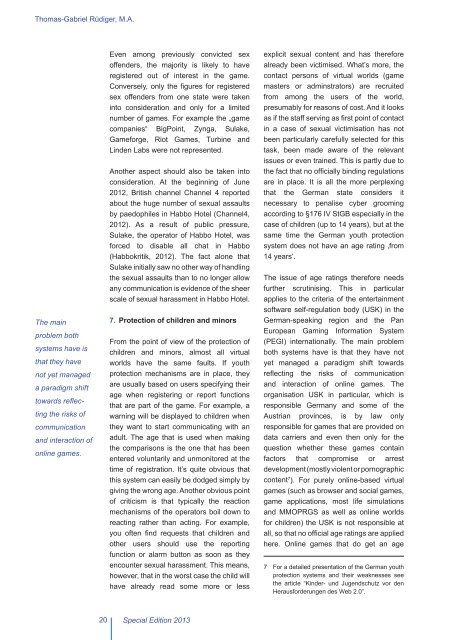ora-schriften-s-2013
ora-schriften-s-2013
ora-schriften-s-2013
Create successful ePaper yourself
Turn your PDF publications into a flip-book with our unique Google optimized e-Paper software.
Thomas-Gabriel Rüdiger, M.A.<br />
The main<br />
problem both<br />
systems have is<br />
that they have<br />
not yet managed<br />
a paradigm shift<br />
towards reflecting<br />
the risks of<br />
communication<br />
and interaction of<br />
online games.<br />
Even among previously convicted sex<br />
offenders, the majority is likely to have<br />
registered out of interest in the game.<br />
Conversely, only the figures for registered<br />
sex offenders from one state were taken<br />
into consideration and only for a limited<br />
number of games. For example the „game<br />
companies“ BigPoint, Zynga, Sulake,<br />
Gameforge, Riot Games, Turbine and<br />
Linden Labs were not represented.<br />
Another aspect should also be taken into<br />
consideration. At the beginning of June<br />
2012, British channel Channel 4 reported<br />
about the huge number of sexual assaults<br />
by paedophiles in Habbo Hotel (Channel4,<br />
2012). As a result of public pressure,<br />
Sulake, the operator of Habbo Hotel, was<br />
forced to disable all chat in Habbo<br />
(Habbokritik, 2012). The fact alone that<br />
Sulake initially saw no other way of handling<br />
the sexual assaults than to no longer allow<br />
any communication is evidence of the sheer<br />
scale of sexual harassment in Habbo Hotel.<br />
7. Protection of children and minors<br />
From the point of view of the protection of<br />
children and minors, almost all virtual<br />
worlds have the same faults. If youth<br />
protection mechanisms are in place, they<br />
are usually based on users specifying their<br />
age when registering or report functions<br />
that are part of the game. For example, a<br />
warning will be displayed to children when<br />
they want to start communicating with an<br />
adult. The age that is used when making<br />
the comparisons is the one that has been<br />
entered voluntarily and unmonitored at the<br />
time of registration. It’s quite obvious that<br />
this system can easily be dodged simply by<br />
giving the wrong age. Another obvious point<br />
of criticism is that typically the reaction<br />
mechanisms of the operators boil down to<br />
reacting rather than acting. For example,<br />
you often find requests that children and<br />
other users should use the reporting<br />
function or alarm button as soon as they<br />
encounter sexual harassment. This means,<br />
however, that in the worst case the child will<br />
have already read some more or less<br />
explicit sexual content and has therefore<br />
already been victimised. What’s more, the<br />
contact persons of virtual worlds (game<br />
masters or adminstrators) are recruited<br />
from among the users of the world,<br />
presumably for reasons of cost. And it looks<br />
as if the staff serving as first point of contact<br />
in a case of sexual victimisation has not<br />
been particularly carefully selected for this<br />
task, been made aware of the relevant<br />
issues or even trained. This is partly due to<br />
the fact that no officially binding regulations<br />
are in place. It is all the more perplexing<br />
that the German state considers it<br />
necessary to penalise cyber grooming<br />
according to §176 IV StGB especially in the<br />
case of children (up to 14 years), but at the<br />
same time the German youth protection<br />
system does not have an age rating ‚from<br />
14 years‘.<br />
The issue of age ratings therefore needs<br />
further scrutinising. This in particular<br />
applies to the criteria of the entertainment<br />
software self-regulation body (USK) in the<br />
German-speaking region and the Pan<br />
European Gaming Information System<br />
(PEGI) internationally. The main problem<br />
both systems have is that they have not<br />
yet managed a paradigm shift towards<br />
reflecting the risks of communication<br />
and interaction of online games. The<br />
organisation USK in particular, which is<br />
responsible Germany and some of the<br />
Austrian provinces, is by law only<br />
responsible for games that are provided on<br />
data carriers and even then only for the<br />
question whether these games contain<br />
factors that compromise or arrest<br />
development (mostly violent or pornographic<br />
content 7 ). For purely online-based virtual<br />
games (such as browser and social games,<br />
game applications, most life simulations<br />
and MMOPRGS as well as online worlds<br />
for children) the USK is not responsible at<br />
all, so that no official age ratings are applied<br />
here. Online games that do get an age<br />
7 For a detailed presentation of the German youth<br />
protection systems and their weaknesses see<br />
the article “Kinder- und Jugendschutz vor den<br />
Herausforderungen des Web 2.0”.<br />
20 Special Edition <strong>2013</strong>





